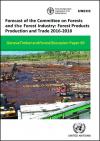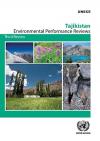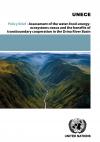Publications
Displaying Results 801 - 820 of 2838
- English
This policy brief synthesizes the main findings and recommendations from the assessment of the water-food-energy-ecosystems nexus ─ essentially of intersectoral links, trade-offs and benefits ─ in the Alazani/Ganykh River Basin, shared by Azerbaijan and Georgia in the Caucasus, that has been carried out in the framework of the UNECE Water Convention’s programme of work for 2013–2015. The
- English
Following the annual Market Discussions of the Committee on Forests and the Forest Industry (former Timber Committee), the Committee issues a statement which includes: overview of the forest products sector, developments in specific forest product market sectors, sawn softwood and sawn hardwood, wood-based panels, wood raw materials including wood energy, pulp and paper, certified forest
- English
The public sector plays a very significant role in modern economies. As in the business sector, innovation can be a major source of productivity growth, cost savings and improvements in service quality; benefits which then also positively affect businesses and citizens who rely on an efficient and effective public sector.
The ability of the public sector to innovate is therefore
- English
Innovation is a pillar of the United Nations 2030 Agenda for Sustainable Development and of approaches to economic development across the world. This is particularly prominent in Belarus, with its legacy of world-class scientific research and industrial production, where the Government has reformed its national innovation system in line with UNECE’s recommendations in its first UNECE
- English
ECE/TRANS/271, Sales No. E.17.VIII.2,ISBN 978-92-1-139160-2, Price: US$ 35, Languages: E, F, RThe Agreement on the International Carriage of Perishable Foodstuffs and on the Special Equipment to be Used for such Carriage (ATP) was done at Geneva on 1 September 1970 and entered into force on 21 November 1976. The objectives of the ATP are to facilitate international transport of
- English
ECE/TIM/DP/67 The ECE Timber Committee and the FAO European Forestry Commission emerged from the International Timber Conference held in 1947 as the key elements of the United Nations tasked with working on matters related to the forest sector in Europe. During their first 70 years of joint activity, the Committee and the Commission have contributed to post war reconstruction, to the expansion
- English
This publication has been developed within the framework of the United for Smart Sustainable Cities (U4SSC) initiative. It provides a series of case studies on smart governance, smart people and smart economy, which will catapult successful smart city practices into the global spotlight.ENG
- English
This publication has been developed within the framework of the United for Smart Sustainable Cities (U4SSC) initiative. It provides a study of the advantages of using ICTs to support the implementation of the Sustainable Development Goals, in particular SDG 11, by facilitating the missing linkages that exist between sustainability policies and urban-planning practices through digitally-enabled
- English
This publication has been developed within the framework of the United for Smart Sustainable Cities (U4SSC) initiative. It provides an overview of how cities can use information and communication technologies (ICTs) to achieve the Sustainable Development Goals (SDGs). It also maps the case studies to the various international agreements as well as the SDGs.
- English
This publication has been developed within the framework of the United for Smart Sustainable Cities (U4SSC) initiative. It provides cities with a methodology on how to collect data or information from key performance indicators (KPIs) for smart sustainable cities (SSC). This set of KPIs for SSC were developed to establish the criteria to evaluate ICT's contributions in making cities smarter and
- English
A small landlocked country, the Republic of Moldova remains one of the poorest countries in South East Europe, with the economy showing continued dependence on low value-added manufacturing and agriculture along with remittances from workers abroad for income generation. The country is yet to reap the benefits of the intensive reform efforts, which have been
- Pусский
The present publication contains the third Environmental Performance Review of Tajikistan. The report takes stock of progress made by the country in the management of its environment since 2010. It also covers issues of specific importance to the country related to legal and policy frameworks, the financing of environmental policies, greening the economy, and integrating environmental concerns
- English
The present publication contains the third Environmental Performance Review of Tajikistan. The report takes stock of progress made by the country in the management of its environment since 2010. It also covers issues of specific importance to the country related to legal and policy frameworks, the financing of environmental policies, greening the economy, and integrating environmental concerns
- English
The GHS addresses classification of chemicals by types of hazard and proposes harmonized hazard communication elements, including labels and safety data sheets. It aims at ensuring that information on physical hazards and toxicity from chemicals be available in order to enhance the protection of human health and the environment during the handling, transport and use of these chemicals.The GHS
- English
This policy brief synthesizes the main findings and recommendations from the assessment of the water-food-energy-ecosystems nexus, linked with a study of benefits of transboundary cooperation, in the Drina River Basin, mainly shared by Bosnia and Herzegovina, Montenegro and Serbia which was carried out from 2016 to 2017 in the framework of the UNECE Water Convention’s Programme of Work.
- English
The United Nations General Assembly designated 21 March as the International Day of Forests to celebrate the importance of forests and trees to all life on earth. Therefore, it is quite fitting that this day was chosen by the UNECE and the FAO in 2014 to showcase and discuss the role of forests in greening the world of fashion. Why does this link between forests and fashion matter? Admittedly
- English
Energy for Sustainable Development in the UNECE Region. If the world is to develop sustainably, it will be necessary to secure access to affordable,reliable, sustainable, and modern energy services while reducing greenhouse gas emissions and the carbon footprint of the energy sector. The brochure















